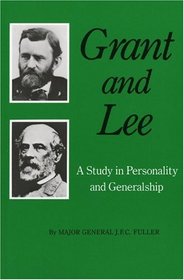This is an interesting book. Originally published in 1933, it was decades ahead of revisionist historians who are beginning to agree Robert E. Lee was not the great general Southern Mythologists would have us believe he was.
The author, a highly respected British military general and author admits he began his research to validate Lee as a great general and decided, due to that research, that Lee wasn't great and U.S. Grant was.
I could cover all the reason why, but I'll just mention one. When historians, as Fuller did, look at the casualty rates for generals commanding armies in the American Civil War, they discover the general who got most of his men killed on the average was Robert E. Lee.
This book, although written much earlier, supports the recent scholarship supporting the author's premise, that Grant, not Lee, was the great American general.
At the same time, for whatever reason, Fuller also makes comments about the American social, political and economic before and during the war which seem to come right out of the "Lost Cause Mythology" text books. These comments have no basis in facts. For example, he repeats the Lost Cause claim the U.S. Constitution allows states to leave the Union. Yet, the Constitution doesn't say this, and if you ask a Lost Causer to show where it states so in the Constitution, they find some excuse to not do so.
It is also interesting when Fuller states P.G. Beauregard was the finest general of the Confederacy. Numerous American historians would be shocked if you told them this.
The author, a highly respected British military general and author admits he began his research to validate Lee as a great general and decided, due to that research, that Lee wasn't great and U.S. Grant was.
I could cover all the reason why, but I'll just mention one. When historians, as Fuller did, look at the casualty rates for generals commanding armies in the American Civil War, they discover the general who got most of his men killed on the average was Robert E. Lee.
This book, although written much earlier, supports the recent scholarship supporting the author's premise, that Grant, not Lee, was the great American general.
At the same time, for whatever reason, Fuller also makes comments about the American social, political and economic before and during the war which seem to come right out of the "Lost Cause Mythology" text books. These comments have no basis in facts. For example, he repeats the Lost Cause claim the U.S. Constitution allows states to leave the Union. Yet, the Constitution doesn't say this, and if you ask a Lost Causer to show where it states so in the Constitution, they find some excuse to not do so.
It is also interesting when Fuller states P.G. Beauregard was the finest general of the Confederacy. Numerous American historians would be shocked if you told them this.




